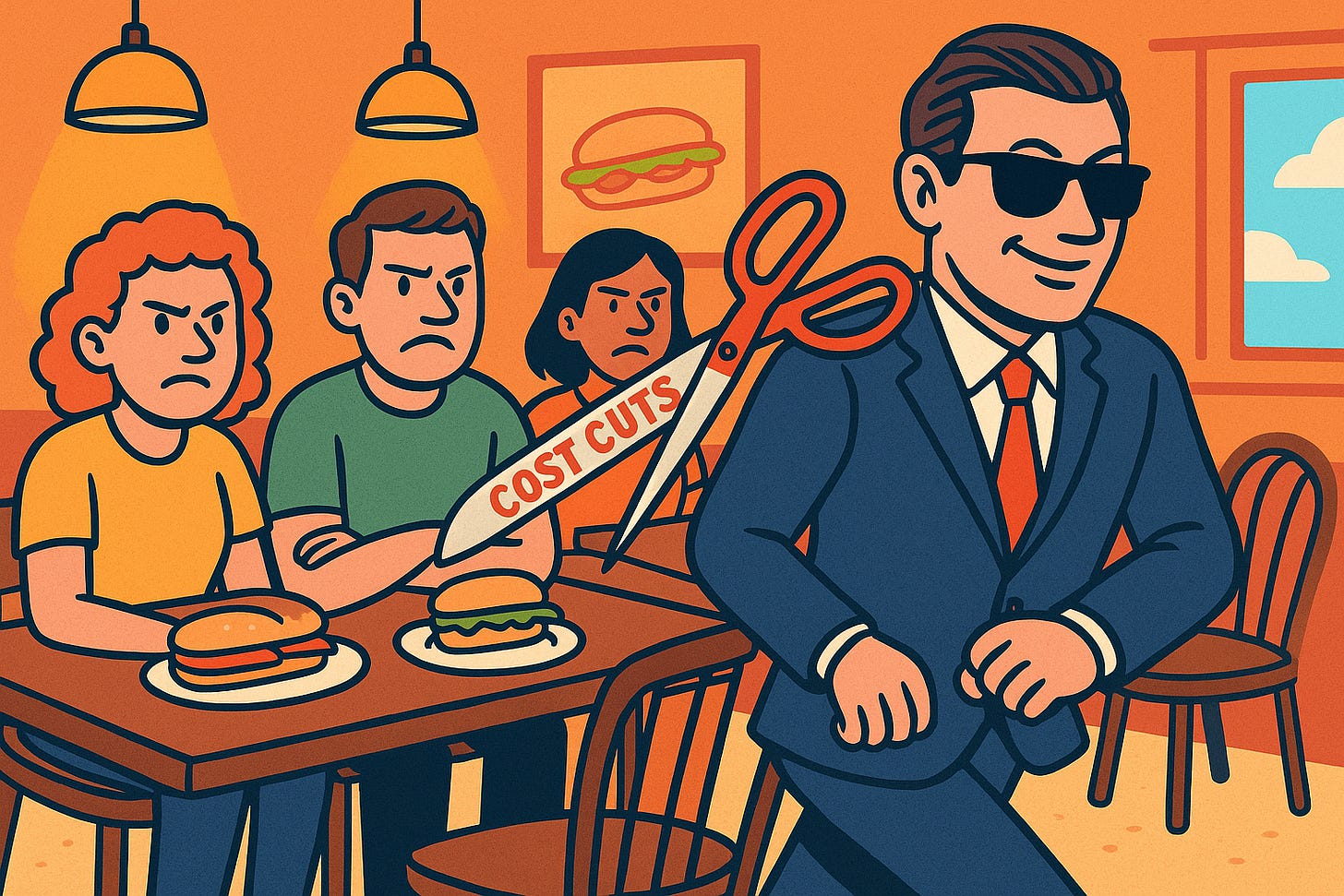You bite into your usual Subway sandwich and something’s off: the rubbery turkey, a whiff of chemical “bread-scent” spray. That subtle downgrade is the calling card of a brand that’s been “private-equitied”: loaded with debt, stripped of quality, and hoping customers won’t notice. But we do.
This isn’t some abstract finance phenomenon. It is a tangible decline in quality that touches every customer. Restaurants, food companies, cosmetics brands have all fallen victim. Once-great businesses are encumbered by their new owners, forced to cut costs because their new Hermes-tie wearing CEO sees this as the only viable strategy to service massive interest payments and juice EBITDA.
I saw it firsthand when I worked in private equity. I've also felt it as a customer. Companies assume no one notices when the Chipotle bowl has less meat, when the Buffalo Wild Wings chicken wings shrink in size, or when the beloved formula for your Kiehl’s Lip Balm quietly changes. But here's the truth: customers always notice.
Take Olive Garden, for example. Once an iconic brand built around hospitality and abundant portions, it became a textbook case of "death by a thousand cuts." Portion sizes shrank, ingredients grew cheaper, and suddenly that emotional experience, which was the reason families returned again and again, was gone. Their CEO insisted that a valid cost cutting measure was to stop salting the water for the pasta. That is nuts (and gross). Customers felt betrayed. And guess what? Traffic declined, competitors seized the opening, and Olive Garden stumbled.
Subway took this playbook to extremes. Remember when "Eat Fresh" meant something? Now "fresh" tastes like a cruel joke. Cheaper meats, tired vegetables, and bread that doesn't feel quite real anymore. No wonder its once-dominant market share has eroded to an army of fast-casual competitors eager to offer higher quality sandwiches. And while we are discussing Subway, the reason those stores all smell that way isn’t from the fresh-baked bread. It’s because they spray the stores with nasty aromatic chemicals.
Buffalo Wild Wings experienced similar missteps. What was once a lively brand synonymous with big games, loud cheers, and great wings has become increasingly synonymous with mediocrity. Customers feel the cut corners and decide the game looks better on their own couch with wings from somewhere else.
Kiehl’s, a brand built around trust and loyalty, learned the hard way that cosmetics consumers are vigilant. Small changes in formulation led longtime fans to seek better alternatives elsewhere. The “Lip Balm #1” was a fan favorite for many decades. Take a look at the reviews on the Kiehl’s site. Trust is fragile. Lose it once, and it's an uphill climb to win it back.
These new short-sighted owners see quality as a line item to slash, rather than the very reason the business succeeded in the first place. They are playing with fire, betting that short-term EBITDA growth can offset the multiple decline that accompanies the systemic erosion of brand value. Maybe in the short term they are right: they cash out, pass the buck, and move on. But long-term it is a losing proposition.
Food is emotional. Dining isn't just about calories and nutrients; it's about comfort, trust, and familiarity. Nobody ever said, “Hey, let’s go back to that place, the lettuce is cheaper now!” People return because the food tastes great and the experience is authentic. The moment you violate that emotional connection, you lose something far more valuable than margin points: you lose loyalty.
Which brings us to Blackstone. Last year, Blackstone announced its acquisition of Jersey Mike's, the beloved sandwich chain known for quality ingredients and unwavering commitment to consistency. Jersey Mike's customers are fiercely loyal. They notice quality and will feel betrayed if corners are cut.
Blackstone, here's my advice: Don’t take the easy path. Don't load Jersey Mike's with debt and force short-sighted cost cuts to hit EBITDA targets. Instead, invest in the very things that made Jersey Mike's great: the fresh ingredients, the authentic recipes, the friendly faces behind the counter. Shaving 30 ¢ off a $9 sandwich may lift margin by 300 basis points, until traffic drops 10 % and leverage multiplies the pain.
Quality matters, and it’s easy to destroy a reputation. Shortchange the sandwich today, and tomorrow the customer eats elsewhere.




Literally just about to get a Jersey Mikes sandwich and now massively depressed.
All food chains seem to go through an expansion phase full of high quality go getters. A stagnant phase. And then a "live off the brand equity" decline phase.